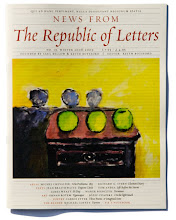Here is a new and untimely feature: taking a look at books that I would guess are not much looked at.
Matthew Josephson: The Politicos, 1938
Lately I've asked a cross-section of friends and correspondents to name US presidents between U.S. Grant and the turn of the twentieth century. The record of correct answers belongs to a gent who was raised in Brooklyn's public schools in a period when kids still got educated. He reeled off four names. Most people are lucky to get one or two -- though Polk is a popular nominee, perhaps because no one can remember a damned thing about him. Wrong, however: his merited oblivion is pre Civil War.
Here is the Rogues' Gallery:
Rutherford B. Hayes, James Garfield, Chester Arthur, Grover Cleveland, Benjamin Harrison, William McKinley.
It is possible they have been erased from memory because all but one of them (Cleveland) were Big Business Republicans in what constitutes a period of our history -- that of the Robber Barons and the political Bosses -- that we would rather forget.
I re-read these books because I thought I discerned a certain relevance between the aftermath of the Civil War and our own post-1989 world, the connecting thread, in a word, being Greed. As a kid coming to America in 1939, that was not a word I associated with the United States. Generous, yes; Greedy, no. Well, , we've come a long way, Baby!
The chances are that Josephson was a bit of a Lefty. During the New Deal, this was no crime. He is not much a man of words, but of hard facts: how the Republicans struck unionists from the rolls; how it contrived to defeat Andrew Johnson, because he thought the question of Negro suffrage was amatter for the several states; how that block of votes led to a party seizing control of the state, while leaving enfranchised Negroes nothing and sustaining, for electoral purposes, a military occupation of the southern states; how offices were bought and sold; how the thirty years of Republican dominance was maintained by funds handed the party by the trusts in an equable quid pro quo; how petty officials, beneficiaries of party patronage were taxed at election time; how the federal budget was regularly robbed by the party and its patrons -- in other words, all the sordid details of corruption and influence-peddling.
I don't think any of us need to be told that hypocrisy is a much-practiced art -- for politicians, the very heart of the matter is how they will be perceived. Nothing new about that. As professors of cant, few can equal the great Massacusetts abolitionists. On behalf of their mills they could see that the industrial supremacy of the North would best be advanced by the destruction of the agricultural South, hence abolishing its slave-owning economy, in the name of 'freedom', was something that would greatly benefit their own growth. It was a clarion-call of patriotism that did the job, and for forty-odd years, Republicans were nicely able to run the country without the southern-based Democrats: in the name of the Union.
And? you may well ask.
Well, I seem to detect in all that more than a whiff of What is good for General Motors is good for America: especially if we bail out the former and set the lawyers loose on the enemy -- those bloody Asians who actually own our country: a form of conduct which can only benefit the Lawyer Empire based on Tort. Back in the happy days of good business government (not Halliburton but the railroads, the iron barons, the whiskey circle) someone thought up a good caper: take over what is now the Dominican Republic; the only constraint was the notion that it wasn't really worth (financially) taking over. Oh, I am perfectly sure that making BP pay to clean up its mess in the Gulf has nothing whatever to do with the oil interests that governed, and still govern, our policies in Iraq and Afghanistan, not to speak of Iran. Very sure.
Reading old books puts you in old places. I commend the practice.
Next: Felix Frankfurter.
Lahti
2 years ago













No comments:
Post a Comment